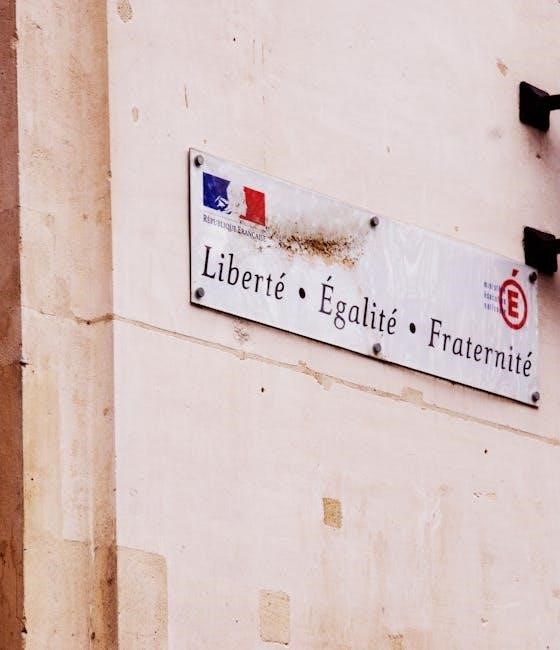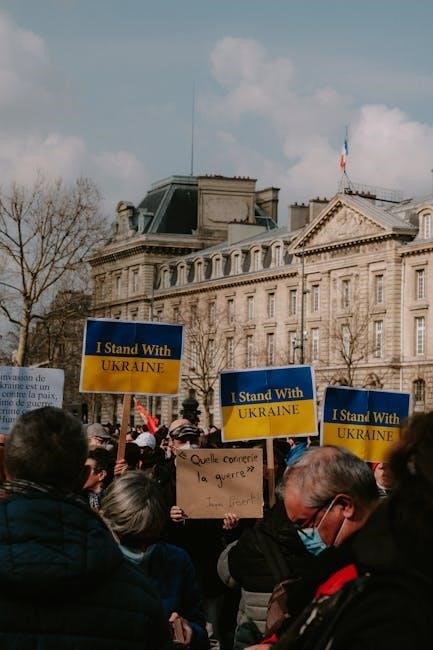The French party system has evolved significantly, shaped by historical events and political shifts. Traditional parties like the Socialists and Republicans dominated until Macron’s centrists rose in 2017.
1.1 Historical Overview of Political Parties in France
The history of French political parties is deeply intertwined with the nation’s revolutionary and republican traditions. Emerging from the French Revolution, early political factions like the Jacobins and Girondists laid the groundwork for modern party systems. The 20th century saw the rise of ideological parties, including the Communist Party, Socialist Party, and Gaullists. Traditional parties dominated until the late 2010s when Emmanuel Macron’s centrist En Marche! disrupted the landscape. The National Rally, formerly National Front, has also played a significant role in shaping France’s political dynamics, reflecting broader shifts in European politics and societal values.
1.2 The Role of Political Parties in French Governance
Political parties in France play a crucial role in shaping the nation’s governance by selecting and promoting leaders, forming alliances, and influencing policy. They serve as vital intermediaries between citizens and the state, reflecting societal interests. Parties also organize legislative and executive branches, ensuring representation across diverse ideologies. Their role extends to shaping public debate and implementing reforms. Additionally, funding mechanisms, such as state subsidies tied to gender balance in candidate lists, highlight their structural importance. Through these functions, French political parties remain central to the country’s democratic framework and institutional stability.
1.3 Current Political Landscape in France
The current political landscape in France reflects a shift toward centrist and populist movements. Emmanuel Macron’s La République En Marche! has dominated since 2017, while traditional parties like the Socialists and Republicans have declined. Marine Le Pen’s Rassemblement National (RN) continues to gain traction, particularly in European elections. The rise of La France Insoumise (LFI) and leftist alliances like NUPES highlights growing ideological diversity. Macron’s governance faces challenges from political fragmentation and social unrest, while parties adapt to changing voter priorities, emphasizing issues like ecology and EU integration. This dynamic landscape underscores the evolving nature of French politics in a post-traditional party era.
Major Political Parties in France
France’s major political parties include La République En Marche!, Rassemblement National, Parti Socialiste, Les Républicains, and La France Insoumise, each representing distinct ideologies and influencing the nation’s governance and elections.

2.1 La République En Marche! (En Marche!)
La République En Marche!, founded in 2016 by Emmanuel Macron, is a centrist, pro-European party that emerged as a response to political disillusionment. It gained prominence in the 2017 presidential and legislative elections, marking a shift from traditional party dominance. The party advocates for economic reform, environmental policies, and social progress, blending liberal and socialist ideas. Despite its rapid rise, it faces criticism for its perceived elitism and lack of grassroots structure. Macron’s re-election in 2022 solidified its influence, though challenges like internal cohesion and public skepticism remain key issues for the party’s long-term viability in French politics.
2.2 Rassemblement National (National Rally)
Rassemblement National, formerly the National Front (FN), is a right-wing populist party founded in 1973. Led by Marine Le Pen since 2011, it advocates for nationalism, immigration control, and EU skepticism. The party rebranded in 2018 to modernize its image. Despite losing the 2022 presidential election, Le Pen gained significant support, reflecting its growing influence. Known for its hardline stance on identity and sovereignty, RN has faced criticism for its radical policies and internal tensions. Its strong performance in the 2019 European elections highlighted its enduring appeal in France’s political landscape.
2.3 Parti Socialiste (Socialist Party)
The Parti Socialiste (PS) is a center-left party with a long history in French politics. Founded in 1969, it has traditionally advocated for social justice, public services, and workers’ rights. The PS dominated French politics during the late 20th century, producing leaders like François Mitterrand and François Hollande. However, its influence waned after Hollande’s presidency due to internal divisions and policy criticism. In recent years, the PS has formed alliances with other left-wing groups, such as La France Insoumise, to challenge Macron’s centrist policies and address issues like inequality and climate change.
2.4 Les Républicains (The Republicans)
Les Républicains (LR), formerly the Union for a Popular Movement (UMP), is a center-right party rooted in Gaullist and liberal traditions. Founded in 2002, it emerged from the Rally for the Republic (RPR) and other conservative groups. LR has historically been a major force in French politics, producing leaders like Jacques Chirac and Nicolas Sarkozy. The party advocates for economic liberalism, strong national security, and traditional values. However, internal divisions and scandals, such as the 2017 presidential campaign’s financial irregularities, have weakened its influence. LR faces challenges in adapting to France’s shifting political landscape while maintaining its conservative identity.
2.5 La France Insoumise (Unsubmissive France)
La France Insoumise (LFI) is a left-wing political party founded in 2016 by Jean-Luc Mélenchon. It emerged as a radical alternative to traditional socialist and communist movements. LFI advocates for social justice, ecological transition, and opposition to neoliberal policies. The party gained prominence during Mélenchon’s 2017 and 2022 presidential campaigns, where he finished third and fourth, respectively. LFI formed alliances with other left-wing parties for the 2022 legislative elections but faced internal tensions when the Socialist Party withdrew from the coalition. Known for its anti-austerity stance, LFI has become a significant force in France’s radical left, pushing for systemic change and greater citizen participation in governance.

Electoral Performance and Trends

France’s electoral landscape reflects shifting voter preferences, with rising populist movements and declining traditional parties. Centrist and far-right candidates, like Macron and Le Pen, dominate recent elections.

3.1 Recent Presidential and Legislative Elections
Recent French elections have shown significant shifts in political dynamics. In the 2022 presidential election, Emmanuel Macron secured a second term, defeating Marine Le Pen in the runoff. The legislative elections that followed saw Macron’s centrist coalition lose its majority, leading to a fragmented National Assembly. Traditional parties like the Socialists and Republicans faced setbacks, while the far-right National Rally made gains. These results highlight the rise of populist movements and the decline of established political forces, reflecting broader voter dissatisfaction with traditional governance.
3.2 The Rise of Populist and Centrist Movements
The rise of populist and centrist movements in France has reshaped its political landscape. Marine Le Pen’s National Rally (RN) gained traction in the 2019 European elections, securing 31.4% of the vote. Centrist Emmanuel Macron’s En Marche! party emerged in 2017, disrupting traditional party dominance. Populist parties leveraged social networks to amplify their influence, capitalizing on voter disillusionment. This shift reflects broader European trends, with centrist and populist movements challenging established political structures, signaling a transformative era in French politics.

Party Funding and Gender Balance
French political parties rely on public subsidies, membership fees, and donations. Funding decreases if gender balance in candidate lists isn’t achieved, promoting equality in political representation.
4.1 Sources of Funding for French Political Parties
French political parties primarily rely on public subsidies, which are allocated based on election results and parliamentary representation. Private donations also contribute, with legal limits to prevent undue influence. Membership fees provide additional revenue, though they are less significant. Transparency measures ensure accountability, and penalties apply if parties fail to meet gender balance requirements in candidate lists, affecting their funding. This system aims to maintain democratic integrity and fairness in political financing.
4.2 Gender Balance in Party Lists and Candidates
French political parties are required to maintain gender balance in their candidate lists, with a law mandating equal representation of men and women. Since 2012, parties face funding cuts if they fail to meet this criterion. This measure has significantly increased female representation in politics. For instance, women now hold over 40% of seats in the National Assembly and nearly half in the European Parliament. Such reforms reflect France’s commitment to gender equality, ensuring diverse representation and challenging traditional political hierarchies. This shift underscores the evolving nature of France’s political landscape.
The Future of Political Parties in France
The future of French political parties lies in adapting to shifting voter preferences and addressing challenges like declining membership and rising populist movements.

5.1 Challenges and Transformations in the Party System
The French party system faces significant challenges, including declining party membership and voter trust; The rise of populist and centrist movements, like Macron’s En Marche!, has disrupted traditional party dominance. Recent elections, such as the 2017 and 2022 presidential races, highlighted shifting voter preferences, with established parties struggling to maintain relevance. The system is also marked by increasing political fluidity, with alliances forming and dissolving rapidly, such as the left-wing coalition in the 2022 legislative elections. These transformations underscore the need for parties to adapt to evolving voter demands and modernize their strategies to remain competitive.
5.2 The Role of French Parties in the European Union
French political parties play a pivotal role in shaping the European Union’s policies and governance. As a founding member of the EU, France’s parties actively influence EU decisions, particularly through their representation in the European Parliament. Pro-European parties like Emmanuel Macron’s En Marche! advocate for stronger EU integration and collaboration. Conversely, parties like the National Rally express euroscepticism, challenging EU policies. French parties also participate in EU-wide alliances, such as the European People’s Party or the Progressive Alliance of Socialists and Democrats. Their engagement reflects France’s commitment to EU governance and highlights the interplay between domestic politics and European integration.
